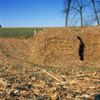
There are at least two good reasons to attend the Bi-State annual crops meeting on December 10 near Covington. Here they are, not necessarily in this order. The meeting will be packed with toms of useful information from Extension specialists and farmers from both states. And the meeting is to be held at the Beef House with a luncheon buffet, so you know the food will be excellent.
The meeting is billed as a crop management and outlook program, and is sponsored by Extension of both Indiana and Illinois. The Beef House is only four miles from the Indiana-Illinois line in west-central Indiana, located just off Interstate 74 at Exit 4, which is the junction of I-74 and Indiana state road 63.
The program is slated to begins t 9 a.m. EST and conclude at 2:45 p.m. EST. Topics that float to the top of the interest chart following this season include nitrogen management and other corn issues, presented by Bob Nielsen will discuss work he and fellow Extension agronomist Jim Camberato have been doing with on-the-go nitrogen applications in the future, based upon devices that measure light reflectance. There are now three on the market offered as commercial products. Nielsen and Camberato have experimented with two of the three in their nitrogen plots.
Vince Davis, University of Illinois Extension, will lead discussion about soybean production challenges. That discussion should be lively after a season filled with white mold, introduction of a new type of soybean varieties from Monsanto, and the unusual migration of soybean aphids into southern counties where they're rarely seen.
Christian Krupke from Purdue Extension will tackle the tough insect questions. He will likely also touch on the aphid issue in soybeans. Fearing a big buildup after the flight of swarming winged aphids in mid-September, so intense it actually drew comments on radio and TV, Krupke and an Illinois-based entomologist toured sites where this insect overwinters on buckthorn in Indiana, Illinois and Michigan. Surprisingly, what they primarily found were dead winged aphids.
Natural predators of the aphids, a group of parasitic fungi, apparently responded to the intense movement of winged adult aphids by ramping up themselves. It's the most intense destruction of winged aphids by fungal predators Krupke has witnessed. The bottom line is he's likely to tell the audience that spring soybean aphid populations in Indiana and Illinois may be lower than what even entomologists first suspected. Since he's continuing to monitor some sites where the overwintering host is prevalent, he may have additional updates on what he expects to see from aphids on soybeans early next spring by the time the meeting rolls around.
The afternoon will feature a panel discussion on precision agriculture topics. Farmers, commercial applicators and Extension specialists are scheduled to participate.
Registration is required, due by November 28. Cost is $15 and an extra $10 if you're requesting credits toward various licenses and accreditations offered with this meeting. Registration can be paid at the door.
To register or learn more, contact Dan Ritter, Newton county Indiana Extension educator, at 219-285-8620. You can also register online at: www.extension.uiuc.edu/edgar.
About the Author(s)
You May Also Like




